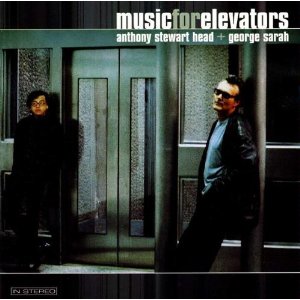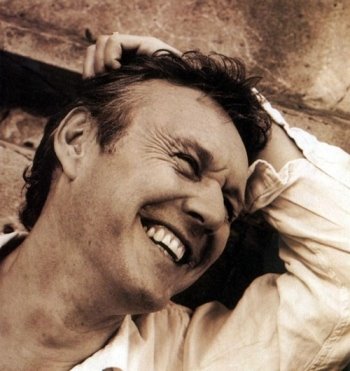
In this week’s Fan Music, I’ll be looking at Anthony Stewart Head’s only released album, Music for Elevators. Most know Head as Buffy’s long-standing Watcher/father figure Rupert Giles or currently from his role on Merlin as King Uther Pendragon. I can claim an even earlier association with him as one half of the romantic storyline from the old Taster’s Choice commercials.
At any rate, in 2002 Head, along with fellow musician George Sarah, released the 16-track CD Music for Elevators. The album became something of a family affair with friends such as James Marsters, Amber Benson, Joss Whedon, and Alyson Hannigan, as well as Tony Head’s mother, lending their vocals and musical talent to the songs. On most songs Head and Sarah combined their efforts on both music and lyrics, but there were some notable exceptions. The music collectively sounds bluesy, like something that comes out of the clubs where everyone’s drinking coffee and smoking cigarettes, but also a very loud club where the speakers are turned up too loud.

“What Can You Tell Me” has a long musical introduction that’s paired with a high level of voice effect when the song actually starts. At times it just seems repetitive with its lack of real substance, but the spoken word overlay gives it a good break near the end. It’s something to dance to rather than listen to with rapt attention.
“Babies [The In Between]” has music by Anthony Stewart Head, along with vocals. It is a song of regret as images of children all around him reminds him of the children he was not there for in their youth, and therefore missed out on all the important milestones. I like this song because it really does tell the story and Head’s voice carries the emotion needed to set the mood.
“Owning My Mistakes” includes vocals by James Marsters. It’s got a large amount of synthesizer overlay, but unlike the first song on the CD it works beautifully for this one because it tells the story through the beat. Marsters background vocals enrich the track because the two vocal styles between him and Head mesh quite well.
“We Can Work It Out” is a cover of an old Beatles song and has vocals contributed by Amber Benson. I was not a fan of the way the song was introduced nor the intrusive back beat that overtook Benson’s vocals throughout the song. It’s the Beatles done wrong.
“Qu’est Ce Que J’ai Fait” has music by George Sarah. Considering the song’s in French, a language I don’t know, I always follow foreign language songs through the soothing beats of the vocalist themselves. Unfortunately, this is another song where the back beat overtook the vocals and it came on too strong to enjoy.

“All The Fun of the Fair” includes vocals by Amber Benson. Finally we have a song where the guest vocals are accompanied brilliantly with Head’s additions, rather than drowned out by the music itself. I love the spoken word integration that this song includes.
“This Town in the Rain” is another jazzy entry that takes you back to the club atmosphere. It’s a beatnik good time. You feel like you’re back in the ’60s with the social commentary and laid back atmosphere. I appreciate that they held back on the back beat volume so that you can feel the song rather than be overwhelmed by it.
“Talk to You” is a little too quiet. Head has trouble overcoming the guitar in certain parts. Considering the subject matter of the song, you would expect the tone to be a little less sad, but it comes out more melancholy than happy. It’s a sad existence to wait by the phone in hopes that the voice on the other end will bring you some kind of light in the darkness.
“Mum’s Song” was written by Head’s late mother and her piano accompaniment was included after her death. It is completely instrumental and sounds wonderful. It gives you a chance to catch your breath and enjoy the quietness after being overwhelmed at points in the CD.
“Last Time” has lyrics and music written by Joss Whedon and includes vocals by Amber Benson. It’s a song of mistrust. The woman in his life will use and leave him, but he knows she’ll come back and he will give her chance after chance because maybe it’s the best he can do.

“One Man’s Rain” starts off, again, with an overuse of synthesizers that almost mimics whale songs. The slowness of the words reminds me of beat poetry, and with how long it stretches the song out it may work against itself. Good social commentary, but perhaps not the best mode of delivery.
“Change” starts with a strong beat that carries throughout the song. We all get to the point where we can choose to carry on or change to see what else is out there. Change can make you stronger and allow you to discover a whole new world. A good message.
“Staring at the Sun” is a hidden track that could likely have stayed hidden. The vocal manipulation induces dizziness and could only be produced in a studio. I was looking for a message, any message, to justify the song and found none.
“End Game” is another hidden track which has Alyson Hannigan speaking during the song and James Marsters reciting “Owning My Mistakes” as a poem seven minutes after the end of the song. It’s a good song to end the CD as it’s a bit lighter and gives you the feeling of looking forward.
The CD is a nice for anyone who likes the novelty of Anthony Stewart Head singing, but I feel like there are better areas where you can hear his vocal stylings such as Repo! The Genetic Opera or Rocky Horror Picture Show or even the Once More With Feeling soundtrack.
Music For Elevators (With George Sarah) (2002)
- What Can You Tell Me
- Babies [The In Between]
- Owning My Mistakes
- [Segue]
- We Can Work It Out
- Qu’est Ce Que J’ai Fait
- All The Fun of the Fair
- This Town in the Rain
- Talk to You
- Mum’s Song
- Last Time
- One Man’s Rain
- [Segue]
- Change
- Staring at the Sun
- End Game







Attributions for “Mum’s Song” based on Abbie Bernstein’s 2002 interview with George Sarah:
One of the guest artists was Helen Shingler, Anthony Stewart Head’s mother, who posthumously contributed the instrumental track entitled “Mum’s Song.” “It was something that Tony’s father recorded – Tony’s mom playing piano, with a Walkman or something,” Sarah explains, “and [it] captured the elegance of this woman just playing in her living room or wherever it was without her knowing about it. The charm about that piece to me is that it sounds like it comes from another place and another time and it is. It’s like a soundtrack to a dream sequence or a memory.”
(http://www.mania.com/george-sarah-music-for-electronica-part-two_article_37058.html)
This album is amazing.
You suck. That is all.
:)
I wouldn’t own the album(or have covered ASH) if I didn’t enjoy it, but for me he has other vocal performances that are better.